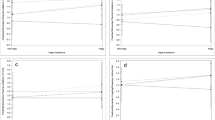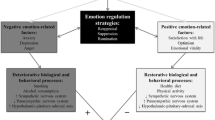Abstract
A meta-analysis of 15 studies was conducted to investigate the relationship between trait anger and ambulatory blood pressure. Overall, the experience of anger was significantly and positively associated with systolic blood pressure (r + = 0.049), but not reliably associated with diastolic blood pressure (r + = 0.028). After removing an outlier, the expression of anger was found to have a reliable inverse relationship with diastolic blood pressure (r + = −0.072). No reliable relationship between expression of anger and systolic blood pressure (r + = −0.041) was found. These results continue to support the modest role of self-reported trait anger and anger expression in blood pressure levels. Several suggestions for future research are discussed, including increasing the focus on the complexity and synergism of these effects.
Similar content being viewed by others
References
Alexander, F. (1939). Emotional factors in essential hypertension. Psychosom. Med. 1: 175–179.
Applegate, W. B. (1989). Hypertension in elderly patients. Ann. Intern. Med. 110: 901–915.
Benotsch, E. G., Christensen, A. J., and McKelvey, L. (1997). Hostility, social support, and ambulatory cardiovascular activity. J. Behav. Med. 20: 163–176.
Booth-Kewley, S., and Friedman, H. S. (1987). Psychological predictors of heart disease: A quantitative review. Psychol. Bull. 101: 343–362.
Brownley, K. (1996). Acute Aerobic Exercise and Social Support Buffer, Cardiovascular Responses to Stress: An Examination of Race Differences in Underlying Physiological and Psychosocial Differences, Unpublished Doctoral Dissertation, University of North Carolina, Chapel Hill.
Buss, A. H. (1961). The Psychology of Aggression, Holt, Rinehart, and Winston, New York.
Carels, R. A., Sherwood, A., and Blumenthal, J. A. (1998). Psychosocial influences on blood pressure during daily life. Int. J. Psychophysiol. 28: 117–120.
Contrada, R. J., and Jussim, L. (1992). What does the Cook–Medley Hostility Scale measure? In search of an adequate measurement model. J. Appl. Soc. Psychol. 22: 615–627.
Cook, W. W., and Medley, D. M. (1954). Proposed hostility and pharisaic-virtue scales for the MMPI. J. Appl. Psychol. 238: 414–418.
De Guademaris, R., Mallion, J. M., Battistella, P., Battistella, B., Siche, J. P., Blatier, J. F., and Francois, M. (1987). Ambulatory blood pressure and variability by age and sex in 200 normotensive subjects: Reference population values. J. Hypertens. 5: S429–S430.
Dembroski, T. M., and Costa, P. T. (1987). Coronary prone behavior: Components of the Type A pattern and hostility. J. Pers. 55: 211–235.
Derogatis, L. R. (1977). SCL-90 Revised Version Manual, John Hopkins University School of Medicine, Baltimore.
Durel, L. A., Carver, C. S., Spitzer, S. B., Llabre, M. M., Weintraub, J. K., Saab, P. G., and Schneiderman, N. (1989). Associations of blood pressure with self-report measures of anger and hostility among black and white men and women. Health Psychol. 8: 557–575.
Ewart, C. K. (1991). Familial transmission of essential hypertension: Genes, environments, and chronic anger. Ann. Behav. Med. 13: 40–47.
Ewart, C. K., and Kolodner, K. B. (1994). Negative affect, gender, and expressive style predict elevated ambulatory blood pressure in adolescents. J. Pers. Soc. Psychol. 66: 596–605.
Fredrikson, M. (1991). Psychophysiological theories on sympathetic nervous system reactivity in the development of essential hypertension. Scand. J. Psychol. 32: 254–274.
Fredrikson, M., and Matthews, K. A. (1990). Cardiovascular responses to behavioral stress and hypertension: A meta-analytic review. Ann. Behav. Med. 12: 30–39.
Fredrikson, M., Robson, A., and Ljungdell, T. (1991). Ambulatory and laboratory blood pressure in individuals with negative and positive family history of hypertension. Health Psychol. 10: 371–377.
Friedman, R., Schwartz, J. E., Schnall, P. L., Landsbergis, P. A., Pieper, C., Gerin, W., and Pickering, T. G. (2001). Psychological variables in hypertension: Relationship to casual or ambulatory blood pressure in men. Psychosom. Med. 63: 19–31.
Gellman, M., Spitzer, S., Ironson, G., Llabre, M., Saab, P., Pasin, R. D., Weidler, D. J., and Schneiderman, N. (1990). Posture, place, and mood effects on ambulatory blood pressure. Psychophysiology 27: 544–551.
Gerin, W., Pickering, T. G., Glynn, L., Christenfeld, N., Schwartz, A., Carroll, D., and Davidson, K. (2000). An historical context for behavioral models of hypertension. J. Psychosom. Res. 48: 369–377.
Goldstein, I. B., and Shapiro, D. (2000). Ambulatory blood pressure in women: Family history of hypertension and personality. Psychol. Health Med. 5: 227–240.
Guyll, M., and Contrada, R. J. (1998). Trait hostility and ambulatory cardiovascular activity: Responses to social interaction. Health Psychol. 17: 30–39.
Hayashi, P. J. (1992). Anger-In, Anger-Out, and Hostility: Associations With Clinic and Ambulatory Blood Pressure in a Biracial Sample of Normotensive and Hypertensive Males and Females, Unpublished Doctoral Dissertation, University of Miami, Miami.
Hedges, L. V., and Olkin, I. (1985). Statistical Methods for Meta-Analysis, Academic Press, New York.
Helmers, K. F., Baker, B., O'Kelly, B., and Tobe, S. (2000). Anger expression, gender, and ambulatory blood pressure in mild, unmedicated adults with hypertension. J. Behav. Med. 22: 60–64.
Hogan, B. (2001). Anger Response Styles and Cardiovascular Health, Unpublished Doctoral Dissertation, University of British Columbia, British Columbia.
Jamner, L. D., Shapiro, D., Goldstein, I. B., and Hug, R. (1991). Ambulatory blood pressure and heart rate in paramedics: Effects of cynical hostility and defensiveness. Psychosom. Med. 53: 393–406.
Jorde, L. P., and Williams, R. R. (1996). Innovative blood pressure measurements yield information not reflected by sitting measurements. Hypertension 8: 252–257.
Jorgensen, R. S., Johnson, B. T., Kolodziej, M. E., and Schreer, G. E. (1996). Elevated blood pressure and personality: A meta-analytic review. Psychol. Bull. 120: 293–320.
Kornegay, C. J. (1998). Effect of Social Support on the Relationship Between Hostility and Seated Blood Pressure and Anger Expression and Ambulatory Blood Pressure in a Bi-Ethnic Community Group, Unpublished Doctoral Dissertation, University of North Carolina at Chapel Hill, Chapel Hill.
Kubzansky, L. D., and Kawachi, I. (2000). Going to the heart of the matter: Do negative emotions cause coronary heart disease? J. Psychosom. Res. 48: 323–337.
Lundberg, U., Hedman, M., Melin, B., and Frankenhaeuser, M. (1989). Type A behavior in healthy males and females as related to physiological reactivity and blood lipids. Psychosom. Med. 51: 113–122.
Manuck, S. B. (1994). Cardiovascular reactivity in cardiovascular disease: “Once more unto the breach.” Int. J. Behav. Med. 1: 4–31.
Miller, T. Q., Smith, T. W., Turner, C. W., Guijarro, M. L., and Hallet, A. J. (1996). A meta-analytic review of research on hostility and physical health. Psychol. Bull. 119: 322–348.
Musante, L., MacDougall, J. M., Dembroski, T. M., and Costa, P. T. (1989). Potential hostility and dimensions of anger. Health Psychol. 8: 343–354.
Myers, H. F., and McClure, F. H. (1993). Psychosocial factors in hypertension in Blacks: The case for an interactional perspective. In Fray, J. C. S., and Douglas, J. G. (Eds.), Pathophysiology of Hypertension in Blacks, Oxford University Press, New York, pp. 69–89.
Pasic, J., Shaprio, D., Jamner, L. D., and Hui, K. K. (1994). Hostility and the response to diuretic in mild-to-moderate hypertension. Am. J. Hypertens. 7: 503–508.
Pickering, T. G. (1982). Hypertension, definitions, natural histories and consequences. Am. J. Med. 52: 570–583.
Pickering, T., Alpert, B. S., DeSwiet, M., Harshfield, G., O'Brien, E., and Shennan, A. H. (1994). Ambulatory Blood Pressure, SpaceLabs Medical, Redmond, WA.
Pickering, T. G., and Friedman, R. (1991). The white coat effect: A neglected role for behavioral factors in hypertension. In McCabe, P. M., Schneiderman, N., Field, T. M., and Skyler, J. S. (Eds.), Stress, Coping, and Disease, Erlbaum, Hillsdale, NY, pp. 35–49.
Pickering, T. G., Phil, D., and Gerin, W. (1990). Cardiovascular reactivity in the laboratory and the role of behavioral factors in hypertension: A critical review. Ann. Behav. Med. 12: 3–16.
Polk, D. E., Kamarck, T. W., and Shiffman, S. (2002). Hostility explains some of the discrepancy between daytime ambulatory and clinic blood pressures. Health Psychol. 21: 202–206.
Porter, L. S., Stone, A. A., and Schwartz, J. E. (1999). Anger expression and ambulatory blood pressure: A comparison of state and trait measures. Psychosom. Med. 61: 454–463.
Raikkonen, K., Matthews, K. A., Flory, J. D., and Owens, J. F. (1999). Effects of hostility on ambulatory blood pressure and mood during daily living in healthy adults. Health Psychol. 18: 44–53.
Review Panel on Coronary-Prone Behavior and Coronary Heart Disease (1978). Coronary-prone behavior and coronary heart disease: A critical review. Circulation 65: 1199–1215.
Rosenthal, R. (1990). How are we doing in soft psychology? Am. Psychol. 45: 775–777.
Rutledge, T., Linden, W., and Davies, R. F. (2000). Psychological response styles and cardiovascular health: Confound or independent risk factor? Health Psychol. 19: 441–451.
Saab, P. G. (1989). Cardiovascular and neuroendocrine responses to challenges in males and females. In Schneiderman, N., Weiss, S. M., and Kaufmann, P. G. (Eds.), Handbook of Research Methods in Cardiovascular Behavior Medicine, Plenum, New York, pp. 453–481.
Shapiro, D., Goldstein, I. B., and Jamner, L. D. (1996). Effects of cynical hostility, anger out, anxiety, and defensiveness on ambulatory blood pressure in black and white college students. Psychosom. Med. 58: 354–364.
Shapiro, D., Jamner, L., and Goldstein, I. B. (1993). Ambulatory stress psychophysiology: The study of “compensatory and defensive counterforces” and conflict in a natural setting. Psychosom. Med. 55: 309–323.
Shaw, W. S. (1998). The Effect of Inhibition of Hostility on Blood Pressure in Stressed Alzheimer Caregivers, Unpublished Doctoral Dissertation, University of California, San Diego.
Siegel, J. M. (1986). The multidimensional anger inventory. J. Pers. Soc. Psychol. 51: 191–200.
Smith, T. W. (1992). Hostility and health: Current status of psychosomatic hypothesis. Health Psychol. 11: 139–150.
Smith, T. W., and Christensen, A. J. (1992). Cardiovascular reactivity and interpersonal relations: Psychosomatic processes in social context. J. Soc. Clin. Psychol. 11: 279–301.
Smith, T. W., and Frohm, K. D. (1985). What's so unhealthy about hostility? Construct validity and psychosocial correlates of the Cook Medley Ho scale. Health Psychol. 4: 503–530.
Spielberger, C. D., Jacobs, G., Russell, S., and Crane, R. (1983). Assessment of anger: The state-trait anger scale. In Butcher, N., and Spielberger, C. D. (Eds.), Advances in Personality Assessment, Vol. 2, Erlbaum, Hillsdale, NJ, pp. 169–189.
Spielberger, C. D., Krasner, S. S., and Solomon, E. P. (1988). The experience, expression, and control of anger. In Janisse, M. P. (Ed.), Health Psychology: Individual Differences and Stress, Springer-Verlag, New York, pp. 89–108.
Stroup-Benham, C. A. (1994). Ambulatory Blood Pressure and Heart Rate Characteristics Among Nurses: Relationships With Anthropometric and Psychosocial Attributes, Unpublished Doctoral Dissertation, University of Texas Medical Branch, Galveston.
Suls, J., and Wan, C. K. (1993). The relationship between trait hostility and cardiovascular reactivity: A quantitative review and analysis. Psychophysiology 30: 615–626.
Suls, J., Wan, C. K., and Costa, P. T. (1995). Relationship of trait anger to resting blood pressure: A meta-analysis. Health Psychol. 14: 444–456.
Williams, C. L. (1996). Hostility, Anger-In, and Social Support: Ambulatory Blood Pressure and Heart Rate in Female 911 Police Dispatchers, Unpublished Doctoral Dissertation, University of California, Los Angeles.
Author information
Authors and Affiliations
Rights and permissions
About this article
Cite this article
Schum, J.L., Jorgensen, R.S., Verhaeghen, P. et al. Trait Anger, Anger Expression, and Ambulatory Blood Pressure: A Meta-Analytic Review. J Behav Med 26, 395–415 (2003). https://doi.org/10.1023/A:1025767900757
Issue Date:
DOI: https://doi.org/10.1023/A:1025767900757




